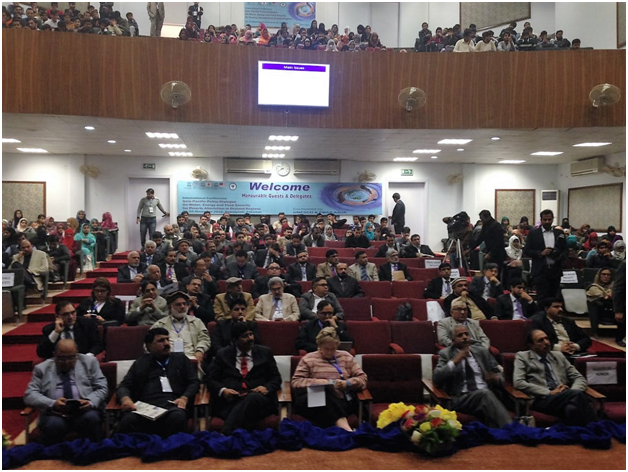UNESCO International Conference: Asia Pacific Policy Dialogue on Water, Energy and Food Security for Poverty Alleviation in Dryland Regions
Go Back

23-25 November 2016, PMAS-AAUR- Pakistan
Co-hosted by UNESCO and PMAS-AAUR
 Asia Pacific Policy Dialogue on Water, Energy and Food Security for Poverty Alleviation in Dryland Regions, was co-organized by UNESCO and PMAS-Arid Agriculture University Rawalpindi (PMAS-UAAR)- Pakistan with the support of Japan Funds-in-Trust and Malaysia Funds-in-Trust, on 23-25 Nov. 2016 at the University. The key objective of this International Conference was to provide an opportunity to hold an international dialogue between policy makers, scientists, academicians, other experts and stakeholders for exploring new dimensions to increase water and food security and alleviate poverty in the resource deficient dryland regions worldwide in the context of Agenda-2030, with particular reference to Asia and the Pacific region, particularly in Pakistan. Around 200 experts from across the Pakistan as well as from International institutions across the Asia & Pacific participated in this dialogue and discussed the thematic areas and proposed policy guidelines and strategies for effective use of resources to ensure water, energy and food security.
Asia Pacific Policy Dialogue on Water, Energy and Food Security for Poverty Alleviation in Dryland Regions, was co-organized by UNESCO and PMAS-Arid Agriculture University Rawalpindi (PMAS-UAAR)- Pakistan with the support of Japan Funds-in-Trust and Malaysia Funds-in-Trust, on 23-25 Nov. 2016 at the University. The key objective of this International Conference was to provide an opportunity to hold an international dialogue between policy makers, scientists, academicians, other experts and stakeholders for exploring new dimensions to increase water and food security and alleviate poverty in the resource deficient dryland regions worldwide in the context of Agenda-2030, with particular reference to Asia and the Pacific region, particularly in Pakistan. Around 200 experts from across the Pakistan as well as from International institutions across the Asia & Pacific participated in this dialogue and discussed the thematic areas and proposed policy guidelines and strategies for effective use of resources to ensure water, energy and food security.
Director, Regional Science Bureau for Asia and the Pacific-UNESCO Jakarta and the Lead Organizer Professor Dr. Shahbaz Khan opened the International Dialogue with his keynote address entitled, “AP-FAST Facility for Accelerating Science & Technology Knowledge Services for SDGs into National Development Plans in Asia and the Pacific”.
 President ECO Science Foundation Professor Dr. Manzoor Hussain Soomro made a Keynote speech entitled, “IBSE Approach for Water, Energy and Food Security leading to Poverty Alleviation in Dryland Regions”. After welcoming all the participants of conference, Prof. Soomro highlighted the importance of current global issues including climate change, emigration for various regions and preparedness of nations as well as the importance of critical thinking and evidence based decision making in the society. He noted that, “whenever the natural disaster happens, either of the two approaches are to be followed; mitigation and adaptation to the situation. Mitigation at the outset becomes a difficult approach, however the adaptation to the situation can only be done if the communities are prepared and have the capacity to understand and manage that crisis. This preparedness requires education and capacity building at large and the best way recognized around the globe is learning by doing”. While focusing on the importance of critical approaches he added, “There is dire need to adopt new scientific approaches for teaching/learning to step forward to the development of vibrant green societies and economies, particularly in the wake of global climate change and Agenda 2030”.
President ECO Science Foundation Professor Dr. Manzoor Hussain Soomro made a Keynote speech entitled, “IBSE Approach for Water, Energy and Food Security leading to Poverty Alleviation in Dryland Regions”. After welcoming all the participants of conference, Prof. Soomro highlighted the importance of current global issues including climate change, emigration for various regions and preparedness of nations as well as the importance of critical thinking and evidence based decision making in the society. He noted that, “whenever the natural disaster happens, either of the two approaches are to be followed; mitigation and adaptation to the situation. Mitigation at the outset becomes a difficult approach, however the adaptation to the situation can only be done if the communities are prepared and have the capacity to understand and manage that crisis. This preparedness requires education and capacity building at large and the best way recognized around the globe is learning by doing”. While focusing on the importance of critical approaches he added, “There is dire need to adopt new scientific approaches for teaching/learning to step forward to the development of vibrant green societies and economies, particularly in the wake of global climate change and Agenda 2030”.
Professor Soomro also shared his experience of practicing FFS approach while working in FAO. Farmer Field Schools (FFS) originally developed by FAO in the 1980s is an example of successful inquiry based learning and teaching and has since spread around the world with certain modifications. “The IBSE and FFS, both emphasize on "inquiry based learning" or the "learning by doing" and "evidence based decision making", he added. The Pakistan experience of FFS approach actually reduced poverty of participating farmers by 12%, according to the empirical data published. Thereby he provided a direct link of IBSE way of education at schools with the development of future rational and capable global citizens to achieve SDGs.
Three days of International Conference concluded to develop policies particularly for dryland regions and implement those to ensure the facilitation of the integration of the newly adopted Sustainable Development Goals (SDGs) into National development plans of respective member states / countries, particularly on SDGs 1, 2, 3, 6, 7, 9, 11, 15 and 17.
